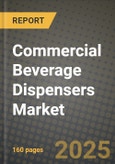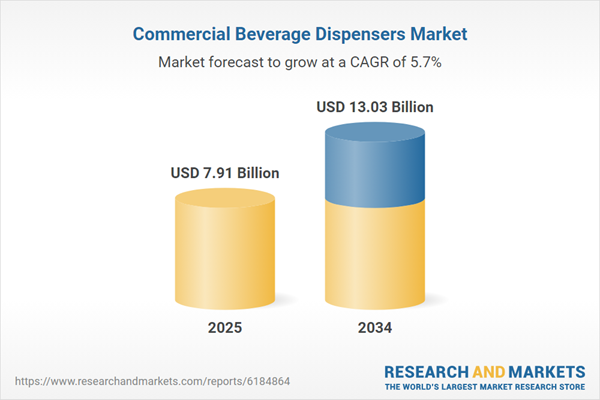Commercial Beverage Dispensers Market
The Commercial Beverage Dispensers Market serves as the backbone of modern, high-throughput beverage service across quick-service restaurants, cafés, hotels, convenience stores, travel hubs, entertainment venues, workplaces, healthcare, and education. Product categories span refrigerated juice dispensers, frozen/slush and granita machines, post-mix fountain systems, hot beverage dispensers (coffee/tea/cocoa), water and flavored-water units, and specialty platforms for cold brew, nitro, and kombucha. Current trends center on touchless dispensing (IR/foot pedal/mobile triggers), IoT telemetry for fleet uptime and route optimization, portion-control to manage yield and shrink, and sustainability - natural refrigerants (e.g., R290), lower standby loads, smart defrost, and recyclable contact parts. Demand is propelled by the expansion of chain foodservice, premiumization of non-alcoholic beverages, format proliferation in c-stores and forecourts, and labor constraints that favor automated, self-serve workflows. Competitive dynamics pit global OEMs and beverage-brand-aligned system providers against nimble regional manufacturers and service-led distributors; success hinges on nationwide install/service coverage, rapid parts availability, and co-marketing with syrup/ingredient partners. The landscape is increasingly “equipment consumables data,” with subscription bundles and outcome-based service levels gaining traction. Hygiene is non-negotiable: NSF/UL compliance, closed-loop bag-in-box, automatic rinse cycles, and antimicrobial materials are differentiators during audits. Constraints include refrigerant regulation, plastics stewardship, supply-chain volatility in compressors/controllers, and heightened cybersecurity expectations for connected fleets. Overall, the market is migrating from single-function boxes to modular, telemetered platforms that deliver consistency, sustainability, and profitability per pour.Commercial Beverage Dispensers Market Key Insights
- Touchless & UX-first design: Infrared sensors, mobile triggers, and guided UI reduce queuing friction and address hygiene expectations. Ergonomics (cup clearance, drip-tray design) directly affect speed of service and spill rates.
- IoT-enabled fleet uptime: Embedded telemetry predicts failures (compressors, augers, valves), optimizes cleaning cycles, and supports dynamic routing for service teams - raising availability and lowering total cost of ownership.
- Yield & portion control: Programmable dosing, Brix monitoring, and flow-restriction hardware standardize cups, protecting margins in high-traffic sites and enabling data-backed upsizing and LTOs.
- Sustainability as spec: Natural refrigerants, energy-efficient compressors, and heat-exchange optimization are increasingly mandatory in tenders; parts recyclability and water-use minimization influence lifecycle bids.
- Format proliferation: Beyond soda and juice, demand is shifting to frozen lemonades, specialty teas, flavored waters, cold brew/nitro, and functional beverages - favoring modular, multi-product systems.
- Service network is strategy: Nationwide (or multi-country) install/repair SLAs, stocked spares, and technician training win rollouts with chains and travel concessions; remote diagnostics speeds first-time fix.
- Food safety & compliance: Closed-loop BIB, auto-rinse/sanitize prompts, and HACCP-ready logs ease audits. Materials and gasket choices cut biofilm risk and shorten nightly clean-down.
- Beverage-brand partnerships: Co-developed valves, syrup libraries, and marketing assets secure fountain headspace and drive co-op promotions; exclusivity terms shape competitive access.
- Configurable footprints: Countertop vs. freestanding, single vs. multi-bowl, and back-room post-mix enable site-by-site optimization, from micro-format c-stores to stadium concourses.
- Financing & bundles: Leasing, equipment-as-a-service, and “pour-per-month” bundles pair hardware, consumables, and maintenance - reducing capex barriers and locking in replacement cycles.
Commercial Beverage Dispensers Market Reginal Analysis
North America
Chain QSRs, convenience retail, and travel concessions anchor demand, with high expectations for speed, uptime, and consistent pour quality. PBM-style procurement in large chains emphasizes energy ratings, telematics, and nationwide service SLAs. Growth in iced coffee, frozen beverages, and flavored waters favors multi-flavor, high-throughput systems. Refrigerant compliance and food-safety documentation are critical in audits. Equipment-consumable tie-ups with beverage majors shape brand presence and fountain access, while franchise programs drive standardized specs at scale.Europe
Energy efficiency, F-gas regulation, and rigorous hygiene standards steer purchasing criteria, elevating natural-refrigerant platforms and low-standby power designs. Multi-brand hospitality, forecourts, and leisure parks prioritize touchless UX and rapid clean-down for staff-light operations. Post-mix remains strong where space and back-room logistics are available; compact countertop units serve urban cafés and micro-kitchens. Lifecycle costing, spare-parts circularity, and compliance documentation weigh heavily in competitive tenders across the EU and UK.Asia-Pacific
Rapid expansion of convenience stores, modern trade, and tea/coffee specialty chains underpins demand across China, India, Southeast Asia, Japan, and South Korea. Menu innovation - bubble tea, fruit teas, frozen beverages, and functional waters - favors modular, multi-bowl and high-clarity refrigerated dispensers. Local manufacturing and regional service partners are decisive for cost and responsiveness. Operators value simple UI, multi-language prompts, and robust components suited to heat/humidity and long operating hours.Middle East & Africa
Hospitality, travel hubs, and mixed-use retail developments drive premium, high-capacity dispensers with strong cold-chain performance. GCC buyers emphasize reliability, water-use efficiency, and fast service support; large venues and resorts prefer telemetry for predictive maintenance. In North Africa and key Sub-Saharan markets, durable, easy-to-clean units with accessible spares are favored. Localization of service, adherence to food-safety norms, and adaptability to variable power quality are practical differentiators.South & Central America
C-stores, casual dining, and entertainment venues propel demand for post-mix and frozen beverage systems, with fruit-juice and flavored-water programs prominent. Buyers weigh capex carefully, making financing bundles and consumable tie-ins attractive. Service coverage and spare-parts availability influence brand choice. Compliance, easy sanitation, and energy performance increasingly appear in municipal and franchise procurements, while compact countertop units support dense urban formats.Commercial Beverage Dispensers Market Segmentation
By Product
- Refrigerated
- Uninsulated
- Insulated
By Material
- Stainless steel
- Glass and acrylic
- Plastic
- Others
Key Market players
Cornelius, Lancer Worldwide, Multiplex (Welbilt), BUNN, Wilbur Curtis (SEB Professional), Grindmaster-Cecilware (Electrolux Professional), Taylor Company (Middleby), Stoelting (Vollrath), Scotsman Ice Systems, Hoshizaki, Follett Products, Franke Coffee Systems, Coca-Cola Freestyle (The Coca-Cola Company), Pepsi Spire (PepsiCo), Zumex GroupCommercial Beverage Dispensers Market Analytics
The report employs rigorous tools, including Porter’s Five Forces, value chain mapping, and scenario-based modelling, to assess supply-demand dynamics. Cross-sector influences from parent, derived, and substitute markets are evaluated to identify risks and opportunities. Trade and pricing analytics provide an up-to-date view of international flows, including leading exporters, importers, and regional price trends.Macroeconomic indicators, policy frameworks such as carbon pricing and energy security strategies, and evolving consumer behaviour are considered in forecasting scenarios. Recent deal flows, partnerships, and technology innovations are incorporated to assess their impact on future market performance.
Commercial Beverage Dispensers Market Competitive Intelligence
The competitive landscape is mapped through proprietary frameworks, profiling leading companies with details on business models, product portfolios, financial performance, and strategic initiatives. Key developments such as mergers & acquisitions, technology collaborations, investment inflows, and regional expansions are analyzed for their competitive impact. The report also identifies emerging players and innovative startups contributing to market disruption.Regional insights highlight the most promising investment destinations, regulatory landscapes, and evolving partnerships across energy and industrial corridors.
Countries Covered
- North America - Commercial Beverage Dispensers market data and outlook to 2034
- United States
- Canada
- Mexico
- Europe - Commercial Beverage Dispensers market data and outlook to 2034
- Germany
- United Kingdom
- France
- Italy
- Spain
- BeNeLux
- Russia
- Sweden
- Asia-Pacific - Commercial Beverage Dispensers market data and outlook to 2034
- China
- Japan
- India
- South Korea
- Australia
- Indonesia
- Malaysia
- Vietnam
- Middle East and Africa - Commercial Beverage Dispensers market data and outlook to 2034
- Saudi Arabia
- South Africa
- Iran
- UAE
- Egypt
- South and Central America - Commercial Beverage Dispensers market data and outlook to 2034
- Brazil
- Argentina
- Chile
- Peru
Research Methodology
This study combines primary inputs from industry experts across the Commercial Beverage Dispensers value chain with secondary data from associations, government publications, trade databases, and company disclosures. Proprietary modeling techniques, including data triangulation, statistical correlation, and scenario planning, are applied to deliver reliable market sizing and forecasting.Key Questions Addressed
- What is the current and forecast market size of the Commercial Beverage Dispensers industry at global, regional, and country levels?
- Which types, applications, and technologies present the highest growth potential?
- How are supply chains adapting to geopolitical and economic shocks?
- What role do policy frameworks, trade flows, and sustainability targets play in shaping demand?
- Who are the leading players, and how are their strategies evolving in the face of global uncertainty?
- Which regional “hotspots” and customer segments will outpace the market, and what go-to-market and partnership models best support entry and expansion?
- Where are the most investable opportunities - across technology roadmaps, sustainability-linked innovation, and M&A - and what is the best segment to invest over the next 3-5 years?
Your Key Takeaways from the Commercial Beverage Dispensers Market Report
- Global Commercial Beverage Dispensers market size and growth projections (CAGR), 2024-2034
- Impact of Russia-Ukraine, Israel-Palestine, and Hamas conflicts on Commercial Beverage Dispensers trade, costs, and supply chains
- Commercial Beverage Dispensers market size, share, and outlook across 5 regions and 27 countries, 2023-2034
- Commercial Beverage Dispensers market size, CAGR, and market share of key products, applications, and end-user verticals, 2023-2034
- Short- and long-term Commercial Beverage Dispensers market trends, drivers, restraints, and opportunities
- Porter’s Five Forces analysis, technological developments, and Commercial Beverage Dispensers supply chain analysis
- Commercial Beverage Dispensers trade analysis, Commercial Beverage Dispensers market price analysis, and Commercial Beverage Dispensers supply/demand dynamics
- Profiles of 5 leading companies - overview, key strategies, financials, and products
- Latest Commercial Beverage Dispensers market news and developments
Additional Support
With the purchase of this report, you will receive:- An updated PDF report and an MS Excel data workbook containing all market tables and figures for easy analysis.
- 7-day post-sale analyst support for clarifications and in-scope supplementary data, ensuring the deliverable aligns precisely with your requirements.
- Complimentary report update to incorporate the latest available data and the impact of recent market developments.
This product will be delivered within 1-3 business days.
Table of Contents
Companies Mentioned
- Cornelius
- Lancer Worldwide
- Multiplex (Welbilt)
- BUNN
- Wilbur Curtis (SEB Professional)
- Grindmaster-Cecilware (Electrolux Professional)
- Taylor Company (Middleby)
- Stoelting (Vollrath)
- Scotsman Ice Systems
- Hoshizaki
- Follett Products
- Franke Coffee Systems
- Coca-Cola Freestyle (The Coca-Cola Company)
- Pepsi Spire (PepsiCo)
- Zumex Group
Table Information
| Report Attribute | Details |
|---|---|
| No. of Pages | 160 |
| Published | November 2025 |
| Forecast Period | 2025 - 2034 |
| Estimated Market Value ( USD | $ 7.91 Billion |
| Forecasted Market Value ( USD | $ 13.03 Billion |
| Compound Annual Growth Rate | 5.7% |
| Regions Covered | Global |
| No. of Companies Mentioned | 15 |









